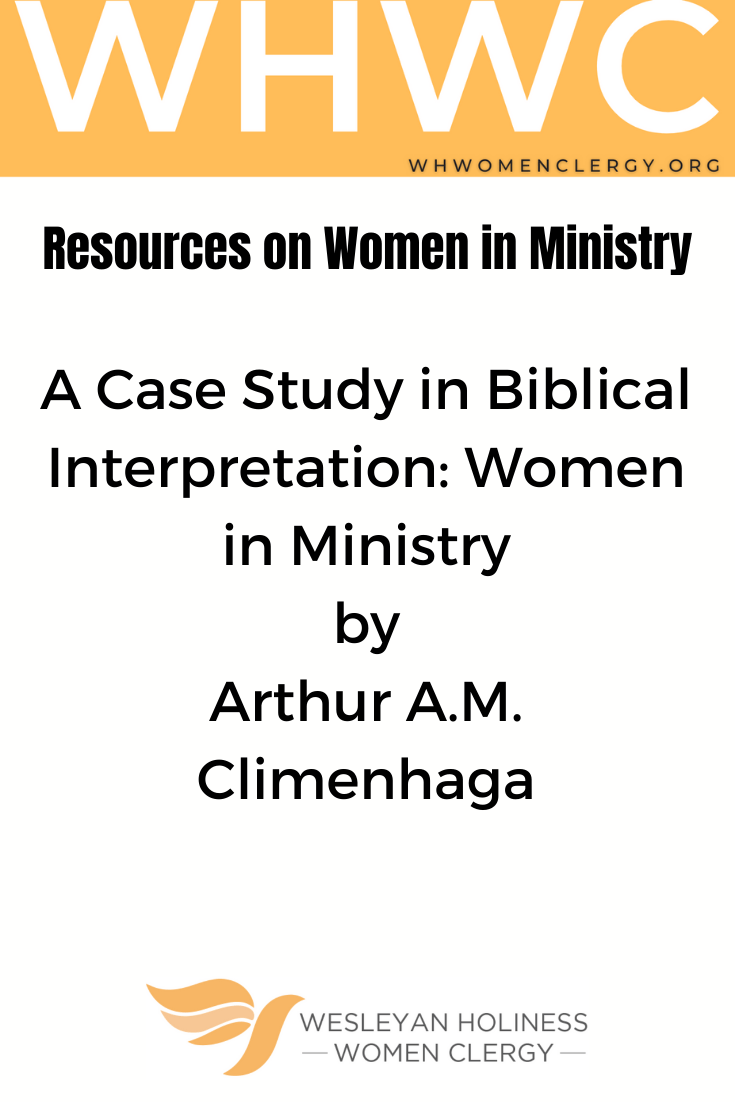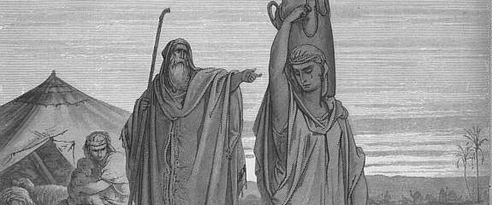Arthur M. Climenhaga is Professor of Theology at Ashland Theological Seminary and Associate for Brethren in Christ World Missions.
A Case Study in Biblical Interpretation: Women in Ministry
Arthur A.M. Climenhaga • February 23, 2022 | WHWC
A Hermenutical Approach

Introduction
In coming to this workshop/case study, there are certain affirmations or understandings which I state as basic to our approach.1
First of all, I am committed to the full inspiration of the Scriptures. I personally subscribe to the inerrancy position in my definition of biblical inspiration. Whether all of us subscribe to that terminological position or not, I take it that all of us will agree that we are committed to the Scriptures as our norm for guidance on all issues, and particularly to the basic issue in this workshop today, viz. women in ministry.2
Second, we need to state the hermeneutical principle to be followed in this workshop setting. The question arises as to whether we understand certain Scriptures in what I shall term a "literalistic/separatistic" way or in what we may term a "principled" way, that is, seeking to understand what the Apostle Paul was addressing within his original context. To follow the first method, which it seems to me is what many have done or do, is to bring certain Scriptures into conflict with other Scriptures. I cannot accept such a divisive hermeneutical principle in light of my adherence to the plenary inspiration of the Scriptures. Thus where I seem to see a potential conflict, I am driven back to take a second look at the setting of the Scriptures(s) involved to see what principle may be there and what the basis for such a hermeneutical approach may be.
With these basic understandings we come to our case study and the question of women in ministry.3
The Basic Question of Study
Certain selected Scriptures have been and are being quoted as giving conclusive evidence that the Bible forbids the authorization of women in ministry. Let us note them as follows: I Corinthians 14:33-37; I Timothy 2:11-15; I Timothy 3:2, 12. There are those who believe these scripture passages settle the issue of women in ministry—or at least the ordination of women. However, as we read the passages carefully, not one speaks to the issue of women in the ministry or even ordination. Such passages can only be used in that way if one uses the attempted sequence, viz. if women are not allowed to speak in the Corinthian church and Paul for some reason doesn't allow women to teach, then certainly women can't be in ministry and certainly not ordained. That comes dangerously close to what we call a "logical non-sequitur," i.e., jumping to a conclusion without the necessary sequence of logical steps to arrive at the same.
Therefore, as we now address ourselves to the question of women in ministry, there are three things we must do: first, note the total context in the Scriptures in relation to women in ministry; second, see what happens if we follow what we termed the "literalistic" hermeneutic; third, investigate what happens when we follow a "contextual" or "principled" hermeneutic.
First of all, then, honest hermeneutics demand consistency in the use of all Scriptures. Thus we note Paul speaking of women prophesying and praying in I Corinthians 11:5.4 Again he speaks in Romans 16:1 of Phoebe, a "deacon" of the church at Cenchrea.5 Further on in Romans 16 he speaks in his greetings of Priscilla and Aquila, putting Priscilla first (v. 3)6; of Andronicus and Junia (v. 7)7 who were of note among the apostles; of Tryphena and Tryphosa, women who worked hard in the Lord. In Philippians 4:2,3, he speaks of Euodias and Syntyche as fellow laborers in the Lord. To the Colossians, Paul writes of Nympha and the church in her house (4:16). In other New Testament areas, one remembers the risen Lord commissioning women to go and tell the disciples of His resurrection, or the four daughters of Philip who had the gift of prophesying (Acts 21:9). We also see the Old Testament background in the records of Deborah, the judge/prophetess (Judges 4 and 5) and Huldah, the prophetess (II Kings 22:14-20). Such a context must speak to us in relation to women in ministry.
A Literalistic Approach and Its Problems
Let us see what happens then if we follow a literalistic interpretation of the three passages above under review. How would such a view affect what we do today in church life?
For one thing, we would have to forbid women from speaking publicly in church, for a literalistic understanding of I Corinthians 14 seems to say that women are to be silent in the church. Under such circumstances, women could not be Sunday school teachers or even speak in any other way. But the Brethren in Christ have never taken such position.
Again, if I Timothy 2:11-15 were taken in the literalistic sense, we would have to forbid women from accepting any position in which they would teach even in church institutions. This would not only exclude them from Sunday school teaching but from other positions, such as teaching at Niagara Christian College (a denominationally-owned institution) or Messiah College (a covenant-related institution denominationally) if male students were there. And one wonders if such prohibition would not extend also to acting as administrators or supervisors in such institutions.
Further, if we take I Timothy 3:2 and 12 literally, we would have to require all chosen for such positions to be the husband of one wife. Unmarried individuals could never serve as bishops/overseers/elders or as deacons under such prohibitions. And yet as Brethren in Christ we have had such serving in our own historical setting.
A Call for Honesty in Our Hermeneutics
What is this saying to us? It says that we have chosen not to interpret these passages in a literalistic way. Instead we have tried to understand them in the biblical and cultural context in which they were written. To be honest in our biblical interpretation we must be consistent in our use of the Scriptures. Either we must forbid all positions of teaching and supervising to women or recognize that these passages cannot be made to speak directly against women in ministry.
The same approach must be used to evaluate other arguments adduced from the Scriptures against the ordination of women. For example, some have argued that since Jesus chose only male apostles, he intended ministers to be males for all time, and that He would have chosen women apostles had he intended women to function as ministers. But the absurdity of such an argument can be seen in Jesus' ministry as He broke down the barriers between Jews and Gentiles. Thus, He flouted conventional customs by interacting with Gentiles (e. g., Samaritan woman at the well; Syro-Phoenician woman; centurion whose servant was sick). Yet all the apostles were Jews. If we follow the line of logic posited above, we would have to say that ministers for all time should be Jews. That is a reductio ad absurdum!
A Hermeneutical Approach on the Basis of
The Principle Involved
What happens then when we take the passages noted and seek to understand the New Testament teaching from the viewpoint of the principle(s) involved? And on the question of women in ministry what would such an approach say?
For one thing, it would mean that specific passages so often used to argue against women in ministry and even the ordination of women should be understood as specific instructions to specific circumstances. For example, in light of Paul's obvious intention not to silence women in worship in I Corinthians, 11:1-168, we can conclude that the Apostle's concern in I Corinthians 14 had to do with the exercise of gifts in the order of worship. He focuses on tongues and gives evidence of concern for a misuse of the gift. The connection between that concern and the statement that women are to keep silence can lead to the possibility that Paul's command was relevant to Corinthian women getting out of order both in the exercise of gifts and in disturbing the spirit of worship.
In a similar way, Paul's sharp statement in I Timothy 2, if taken in a contextual/principle way, appears to address a situation in which teaching activities by certain women have been in contradistinction to Paul's authoritative teachings and may even have brought disrepute on the church. But such advice/commands should not be taken to controvert his allowance from women to pray and prophecy within the church. Also, when it comes to I Timothy 3:2, Paul is not speaking to whether or not women should be pastors or whether single males may be ordained or not. He actually is forbidding the position of an overseer to those who have more than one wife.
Other Relevant Considerations
Other considerations are as follows:
1. In Galatians 3:28 we see Paul stating the principle that in Christ there is neither male nor female. Certainly, this does not infer that distinctions between male and female should be disregarded. But it does mean that spiritually there are no longer any distinctions between male and female, as had definitely been the case in Judaism. All are equal in Christ. Any attempt to deny not only salvation but also spiritual gifts to either men or women goes directly against the grain of this great principle.
2. While the priesthood in the Old Testament was completely closed to women, we find the New Testament moving in a definite direction towards the participation of women in ministry. In fact, as we see in I Peter 2:5, the New Testament sets forth the profound truth of the priesthood of all believers. Thus we see the amazing changes in a short period of time which resulted in such moves as Paul taking on co-workers such as Priscilla, Phoebe, Tryphena, Tryphosa, Euodias (Eudia), Syntyche, and others almost too numerous to mention.
3. Let us think in terms of an analogy in reply to the question, Can women be in the Christian ministry? In certain cases, it appears to be quite apparent that God intended the church to continue in a developing movement after New Testament times that would be consonant with and based upon revealed principles. A specific issue, for example, is that of slavery. Paul states in Galatians 3:28 a principle, "There is neither slave nor free in Christ." Yet we do not find him specifically forbidding the practice of slavery at that time. But the principle of the abolishment of slavery worked in the history of the church and the times. We would agree, would we not, that God intended movement in the direction to which the New Testament principle pointed—no slavery at all?9
4. Let us in the same way apply the principle concept to the issue of "women in the Christian ministry." Is it consistent with New Testament principles to have women in the Christian ministry today, even to ordain them? As we look at both the Scriptures in their total context and then at the ensuing evidence, I believe we will affirm that God does want us to open the doors of ministry to all of His own. As we look at the cultural milieu in which we live, we need to make this scriptural principle a reality, bringing our sisters into full participation in Christian ministry, including ordination. Why do we say this? I suggest three reasons as follows:10
First, we see in the Scripture the spiritual oneness of male and female in Christ, the priesthood of all believers, and ask, Does that not lead in the direction of full participation of male and female in ministry?
Second, we see our sisters sensing God's call in their hearts leading them to preparation for ministry. We see them equipped with spiritual gifts, enabling them to do the tasks of pastoral ministry.
Third, we have seen God blessing the ministry of women. In my lifetime I recall, to name but a few, the ministry of an Anna Kraybill Engle in our Thomas, Oklahoma, church; of Maggie Sollenberger in the San Francisco Life Line Mission; of Sarah Bert in the Chicago Mission; of Frances Davidson in Africa and at Messiah College; of Katie Smith Buckwalter in India and home missions. I personally have seen and felt the ministry of most of these women at some point in my life and have also seen the larger fields of their endeavors as they brought men and women to Jesus Christ.
Conclusion
With a reordered understanding of the Scripture so commonly used against women in ministry and teaching, I take a look at the larger scriptural context. I think of the position in which Peter and his fellow Christians found themselves when they went to preach to Cornelius and his household. They were shocked as they witnessed the Spirit being outpoured on Gentiles just as He was on Jews, and that without the rites of circumcision. Even though they had not understood that in Christ there is neither Jew nor Gentile, and Peter had had but a glimmer of it with the vision of all kinds of beasts let down from heaven, yet when they saw the evidence of the Spirit falling on the Gentiles, Peter cried out, "Can anyone keep these people from being baptized with water? They have received the Holy Sprit just as we have (Acts 10:47)."
As Brethren in Christ we are not called on to believe that there is any new grace or qualification added even in an act of ordination, but rather that this is public recognition of divine calling to ministry in the gospel of Jesus Christ . . . . In the Petrine vein we may be constrained to say, "How can we men keep women from being ordained when they have received the Holy Spirit just as we have?"
NOTES
1 I acknowledge very material help in preparation for this workshop presentation from John C. Brunt, "Ordination of Women: A Hermeneutical Question," Ministry (September 1988), 12-14. Brunt is Dean of the School of Theology at Walla Walla College in Washington. Naturally, there are several variant viewpoints between the author's basic Seventh-Day Adventist approach and my firm commitment to the Brethren in Christ and general evangelical approach. However, the author's general viewpoint and wrestling with the hermeneutical question involved is consonant with my own wrestlings. I have reformed the concepts in my own terms and made them relevant to the Brethren in Christ setting. Thus any direct quotation used has a notation as to its source in Dr. Brunt's article.
2 Full consideration of the nuances involved in development of inerrancy and inspiration of the Scriptures is another matter and not necessarily germane to the workshop consideration. However, I have emphasized my adherence to the inerrancy viewpoint of scriptural inspiration lest some would be tempted to assert that anyone who can come to a viewpoint allowing for women in ministry must be weak in his/her concept of inspiration.
3 I have chosen the terminology, "women in ministry" rather than "ordination of women" at this point deliberately, although I will later on use both expressions in the workshop development. If one can settle the issue of women in Christian ministry, I believe the question of ordination becomes moot.
4 In introducing this reference, we realize that there is a larger context in
I Corinthians 11:1-16 dealing with order in creation and the symbolic form for expression of the same. This area is another hermeneutical problem. I addressed the same in a Master's thesis, "The Doctrine of the Veiling," and at that time in all academic and spiritual honesty came to certain conclusions. I now realize I did this in the cultural context of the western world. Contacts with other cultures make one realize the need for fresh hermeneutical wrestling with the passage. For example, many African peoples whose hair style does not fit the expressions in the Corinthian passage; Japanese culture which says that a woman who keeps her head covered exhibits prostitute tendencies. In that light, one looks for the abiding principle in the passage and seeks its hermeneutical application in a modern world. That is another study in its own right, beyond the compass of this workshop study.
5 Note the Greek word is "deacon," not "servant" (KJV) or "deaconess" (NIV). Why have modern translators avoided the word "deacon"? Is there a certain chauvinism involved?
6 See also II Timothy 4:19.
7 Note here that in the Greek text the name is Junia, a feminine form of the name, not Junias, as the NIV translates it. One wonders if the feminine form ‘Junia' was a man or a woman. Due to the uncertainty, this particular reference is not as clear as others in reference to women serving in Christian ministry.
8 As Dr. Brunt states, "That Paul does not intend to silence women in worship is obvious from I Corinthians 11. He permits them to both pray and prophesy in church as long as they are appropriately attired (which in the cultural context of Corinth means wearing veils). Since Paul uses the term "prophesying" to include what we would call preaching—the speaking for God within the worship service—this passage proves that Paul did not really intend to silence women in church" (see page 13).
9 Ibid., 14.
10 Again I acknowledge my indebtedness to Dr. Brunt's article, p. 14, for these concepts following, which I have restated in my own words.

Enjoyed this article? Connect with us on one of our social media platforms. Share it and forward it to a friend:





